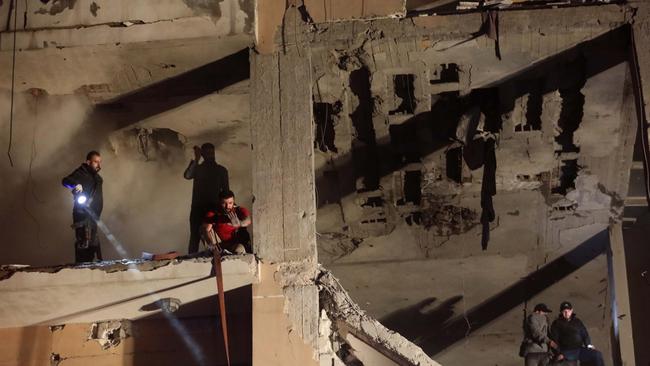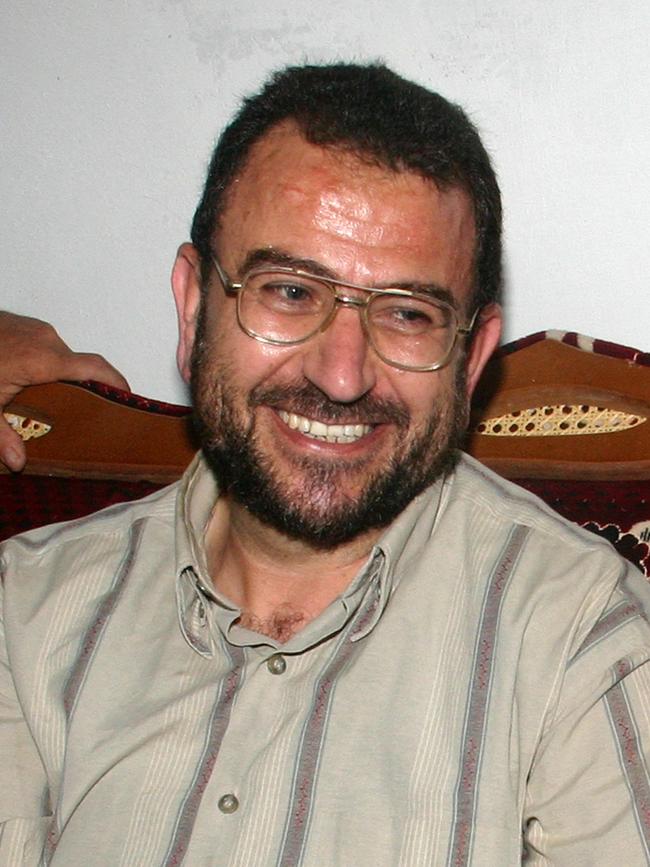Israeli strike kills Hamas deputy leader Saleh al-Arouri in Beirut
The Israeli army says it’s ‘prepared for any scenario’ after fears the war would spread after the strike that killed Saleh al-Arouri.

The Israeli army said on Wednesday it was “prepared for any scenario” after a strike in Beirut killed Hamas’s deputy chief, stoking fears its war in the Gaza Strip could spill over into a regional conflict.
Israel’s war against Hamas, launched after the Palestinian terrorist group’s October 7 attacks, reached Lebanon on Tuesday with the strike that killed Saleh al-Arouri along with his bodyguards.
Israel, which has vowed to destroy Hamas, has previously announced the killing in Gaza of the group’s commanders and officials during the war, but Arouri is the most high-profile figure to be killed, and his death came in the first strike on the Lebanese capital since hostilities began.
Israeli army spokesman Daniel Hagari did not directly comment on Arouri’s killing but said the military was “highly prepared for any scenario” in its aftermath.
Lebanese state media reported the strike hit a Hamas office in Beirut’s southern suburbs, a stronghold of Lebanon’s Iran-backed Hezbollah movement, a Hamas ally. Hamas TV also said Israel had killed Arouri in Lebanon, and Lebanese media reported a total of seven people were killed in the attack by an Israeli drone. The strike adds to widespread fears that the nearly three-month-old Israel-Hamas war could become a wider regional conflagration.
Hamas said the killing would not lead to its defeat, while Hezbollah vowed Arouri’s death would not go “unpunished”. Hezbollah called it “a serious assault on Lebanon … and a dangerous development in the course of the war.”
Lebanese Prime Minister Najib Mikati condemned the killing and said it “aims to draw Lebanon” further into the Israel-Hamas war.
In a call with Israeli war cabinet member Benny Gantz after the strike, French President Emmanuel Macron urged Israel to “avoid any escalatory attitude, particularly in Lebanon”.
Hamas’s bloody attack on October 7 resulted in the deaths of around 1140 people in Israel, most of them civilians. Militants also took around 250 hostages back to Gaza – which has been ruled by Hamas since 2007 – of whom 129 remain in captivity.

After the attack, the worst in its history, Israel began a relentless bombardment and ground offensive that has killed at least 22,185 people, mostly women and children, according to Gaza’s health ministry. The Israeli army says 173 of its soldiers have been killed fighting Hamas in Gaza.
On Tuesday, Israel’s army said soldiers in Gaza had killed “dozens of terrorists”, including some carrying explosives. It said they also raided a weapons storage compound in the southern city of Khan Younis and discovered long-range rocket launchers and tunnels.
The territory’s Hamas-run health ministry said 70 people were killed and more than 100 wounded in the previous 24 hours during Israeli raids.
In Khan Younis, the Palestine Red Crescent Society said Israel twice struck its headquarters, resulting in “five casualties and three injuries” among displaced people who had sought refuge there and at a nearby hospital.
The head of the World Health Organisation denounced the alleged strikes, saying they “severely damaged” a Red Crescent training centre within the Al-Amal hospital. “Today’s bombardments are unconscionable. Gaza’s health system is already on its knees, with health and aid workers continuously stymied in their efforts to save lives due to the hostilities,” WHO Director-General Tedros Adhanom Ghebreyesus said on X.
UN agencies have voiced alarm over Gaza’s spiralling humanitarian crisis, which has left 2.4 million people under siege, most of them displaced and crowded into shelters and tents during winter rains. The WHO has warned of the risk of famine and disease, with only a minimal amount of aid entering. On Tuesday, a British ship delivered the first 87 tonnes of aid for Gaza – including thousands of thermal blankets – to Egypt from Cyprus, which proposed the maritime corridor initiative.
“Hamas people are hiding in their houses and the tunnels, while we don’t find food or drink and are dying of cold. I have an infant, I can’t get him diapers or baby formula,” said Wojud Kamal al-Shinbary, who like many Gazans made her way to Rafah, in the south.
In early December, after a week-long truce that saw Israeli hostages freed in exchange for Palestinian prisoners, Arouri said there would be no more releases without a permanent ceasefire.
“The price to pay for the release of Zionist prisoners will be the release of all our prisoners – after a ceasefire,” he said.
Arouri, who lived in exile, was accused by Israel of masterminding numerous attacks. He was elected deputy to Hamas chief Ismail Haniyeh in 2017, before being officially named the group’s number two. In October, the Israeli army demolished Arouri’s home in the disputed West Bank. After the death of his deputy, Haniyeh said that a movement “whose leaders fall as martyrs for the dignity of our people and our nation will never be defeated”.
AFP



To join the conversation, please log in. Don't have an account? Register
Join the conversation, you are commenting as Logout